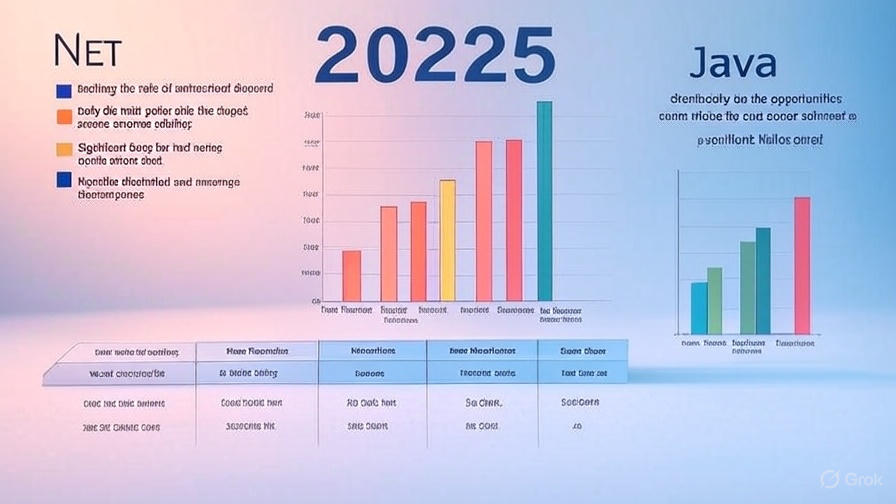.NET vs Java: Which Offers Better Career Opportunities in 2025?
In the ever-evolving landscape of software development, choosing the right technology stack can significantly impact your career trajectory. As we step into 2025, the debate between .NET and Java continues to be a hot topic among developers. Both technologies have their unique strengths and weaknesses, and understanding these can help you make an informed decision about which path to pursue. If you’re looking to enhance your skills, consider exploring dot net training online free with certification to get a head start.
Understanding .NET and Java
What is .NET?
.NET is a free, cross-platform, open-source developer platform created by Microsoft. It is designed to build a variety of applications, including web, mobile, desktop, gaming, and IoT. The .NET ecosystem includes languages like C#, F#, and Visual Basic, along with a rich set of libraries and tools.
What is Java?
Java, on the other hand, is a class-based, object-oriented programming language developed by Sun Microsystems (now owned by Oracle). It is known for its portability across platforms, thanks to the Java Virtual Machine (JVM). Java is widely used in enterprise-scale applications, mobile applications (especially Android), and large-scale systems.
Career Opportunities in .NET
Job Market and Demand
The demand for .NET developers remains strong, particularly in enterprises that rely on Microsoft technologies. According to various job portals, .NET developers are consistently sought after for their expertise in building robust and scalable applications. The versatility of .NET, which allows developers to work on both front-end and back-end development, makes it a valuable skill set.
Salary Prospects
In terms of salary, .NET developers are well-compensated. The average salary for a .NET developer varies by region but generally ranges from $70,000 to $120,000 annually. Senior developers and those with specialized skills in areas like cloud integration and microservices can command even higher salaries.
Skill Development and Learning Resources
For those interested in pursuing a career in .NET, there are numerous resources available. Online courses, such as the .net full stack developer course, provide comprehensive training that covers both fundamental and advanced topics. Additionally, Microsoft’s official documentation and community forums offer extensive support and learning materials.
Career Opportunities in Java
Job Market and Demand
Java’s popularity in the enterprise sector ensures a steady demand for skilled Java developers. Java is particularly dominant in the financial services industry, large-scale e-commerce platforms, and Android mobile development. The job market for Java developers is robust, with numerous opportunities for both junior and senior developers.
Salary Prospects
Java developers also enjoy competitive salaries. The average salary for a Java developer typically ranges from $80,000 to $130,000 annually. Developers with expertise in high-demand areas such as big data, cloud computing, and enterprise applications can earn significantly more.
Skill Development and Learning Resources
There are abundant resources available for learning Java, including online courses, books, and community forums. Platforms like Coursera, Udemy, and edX offer courses that cater to different skill levels. Additionally, Oracle’s official Java tutorials and documentation are invaluable resources for both beginners and experienced developers.
Comparing .NET and Java
Ease of Learning
Both .NET and Java have their learning curves. .NET, with its integration with Visual Studio, offers a highly productive development environment that can be easier for beginners to grasp. Java, while also beginner-friendly, requires a good understanding of object-oriented programming principles and can be more verbose compared to C#.
Community and Ecosystem
Java boasts a large and active community, with a vast ecosystem of libraries and frameworks. This extensive support network can be a significant advantage for developers. .NET also has a strong community, particularly within the Microsoft ecosystem, and benefits from continuous updates and support from Microsoft.
Performance and Scalability
Both technologies are known for their performance and scalability. Java’s JVM provides excellent performance optimizations, making it suitable for large-scale applications. .NET, particularly with the advent of .NET Core, offers high performance and scalability, making it a strong contender for modern application development.
Versatility and Use Cases
Java’s “write once, run anywhere” capability makes it highly versatile, suitable for a wide range of applications from web to mobile to embedded systems. .NET, while traditionally associated with Windows applications, has expanded its reach with .NET Core, enabling cross-platform development and a broader range of use cases.
Future Trends and Industry Adoption
Emerging Technologies
Both .NET and Java are evolving to keep pace with emerging technologies. .NET is increasingly being used in cloud computing, IoT, and AI applications. Java continues to be a key player in big data, cloud computing, and enterprise solutions. Keeping an eye on these trends can help developers align their skills with future industry needs.
Industry Adoption
Industry adoption of both technologies remains strong. .NET is widely used in enterprises that leverage Microsoft technologies, while Java is prevalent in large-scale enterprise environments and Android development. Understanding the specific industries and companies that favor each technology can help in making a career choice.
Making the Right Choice
Assessing Your Career Goals
When deciding between .NET and Java, it’s essential to assess your career goals and interests. If you are inclined towards Microsoft technologies and enjoy working with a tightly integrated development environment, .NET might be the better choice. On the other hand, if you are interested in enterprise applications, Android development, or working in a diverse range of environments, Java could be more suitable.
Evaluating Market Trends
Staying updated with market trends and industry demands is crucial. Both .NET and Java have their place in the tech industry, and the choice between them should be based on current job market trends, salary prospects, and the types of projects you are passionate about.
Continuous Learning and Adaptation
Regardless of the technology you choose, continuous learning and adaptation are key to a successful career in software development. Both .NET and Java ecosystems are continually evolving, and staying abreast of the latest updates, tools, and best practices will ensure long-term career growth.
Conclusion
In conclusion, both .NET and Java offer promising career opportunities in 2025. The choice between the two should be guided by your career aspirations, the specific industries you are interested in, and the types of projects you enjoy working on. By carefully evaluating the job market, salary prospects, and learning resources, you can make an informed decision that aligns with your professional goals. Ultimately, both technologies provide robust platforms for building a successful and fulfilling career in software development. As you consider your options, remember that the tech industry values versatility and continuous learning, so being proficient in either .NET or Java can open up numerous career opportunities.
FAQs
What are the primary differences between .NET and Java?
.NET is a developer platform created by Microsoft, primarily using languages like C# and F#, while Java is a programming language known for its portability across platforms via the Java Virtual Machine (JVM).
Which technology is easier to learn, .NET or Java?
Both technologies have their learning curves. .NET, with its integration with Visual Studio, can be easier for beginners, while Java requires a solid understanding of object-oriented programming principles.
What are the job market prospects for .NET developers in 2025?
The job market for .NET developers remains strong, particularly in enterprises that rely on Microsoft technologies. The demand for .NET developers is consistent, with competitive salary prospects.
How does the salary of a Java developer compare to that of a .NET developer?
Both Java and .NET developers enjoy competitive salaries. Java developers typically earn between $80,000 and $130,000 annually, while .NET developers earn between $70,000 and $120,000 annually, depending on experience and specialization.
What industries predominantly use Java?
Java is widely used in the financial services industry, large-scale e-commerce platforms, and Android mobile development.
What are the emerging trends for .NET in 2025?
.NET is increasingly being used in cloud computing, IoT, and AI applications. The evolution of .NET Core has also expanded its use cases to include cross-platform development.
How can I start learning .NET or Java?
There are numerous online courses and resources available for both .NET and Java. For .NET, you can explore courses like the dot net training online free with certification. For Java, platforms like Coursera, Udemy, and edX offer comprehensive courses.
What is the future outlook for Java developers?
The future outlook for Java developers is positive, with steady demand in enterprise-scale applications, mobile development, and large-scale systems. Java’s versatility ensures its continued relevance in the tech industry.
Can I switch from Java to .NET or vice versa?
Yes, switching between Java and .NET is possible. Both technologies share common programming principles, and transitioning between them involves learning the specific syntax and ecosystem of the new technology.
What are the key factors to consider when choosing between .NET and Java?
Key factors to consider include your career goals, the specific industries you are interested in, job market trends, salary prospects, and the types of projects you enjoy working on. Evaluating these factors will help you make an informed decision.




